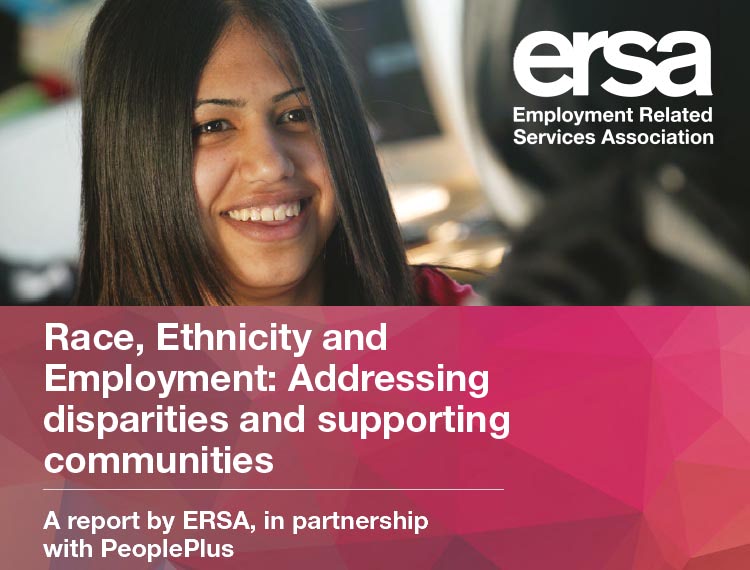New report calls on Government to close the race employment gap by engaging community partners

Today (31 Oct), the Employment Related Service Association (ERSA), in partnership with PeoplePlus, published Race, Ethnicity and Employment: Addressing Disparities and Supporting Communities, a report highlighting the employment gap between different ethnic groups in the UK.
The report finds that Government could do more to close this gap by providing more tailored, quality employment support through specialist partners embedded in local communities.
The report comes one year on from the publication of Prime Minister’s Race Disparity Audit findings, which uncovered a race employment gap of nearly 12% between white and non white groups, as well as lower rates of pay and career progression.
The report digs below the data to uncover the practical barriers facing people from ethnic minority backgrounds, providing a series of expert-led recommendations to help more people into work.
The report welcomes the Government’s recent announcements to support ethnic minority employees through an employer charter and calls for this to be matched by efforts to provide more specialist employment support for jobseekers outside of the Job Centre.
Local providers, including charity groups and community organisations, have trusting relationships with individuals and understand their specific barriers to work. With years of local experience, they have developed bespoke community programmes that offer effective community-based employment support.
Examples of tailored initiatives include the QED Foundation, which provides careers advice for hundreds of Muslim students at risk of failing to fulfil their potential and engages their parents about career options in 34 madrassahs serving disadvantaged communities in West Yorkshire, the East Midlands and the North West.
 |
||||
| … |
QED Foundation realised that these trusted community anchors are ideal venues for supporting families who might have little involvement with mainstream schools. However, their staff often have limited up-to-date information about the issues that can affect young people’s aspirations. QED Foundation delivered career and training advice and guidance in 34 madrassahs serving disadvantaged communities in West Yorkshire, the East Midlands and the North West. The programme worked with 400 Muslim students, who were at risk of failing to fulfil their potential at school and not progressing to further education, employment or training. It also engaged their parents, who were ill equipped to offer young people advice about the career options available to them. In many cases this was the first time families had discussed their children’s futures together. The programme also included 17 seminars introducing successful role models from local communities, who advocated the importance of studying and making informed career choices. |
… |
The initiative increased the number of students intending to stay on at school after year 11 by approximately 50% and those wishing to go on to college or further education by nearly 25%. Twice as many expected to progress to training and apprenticeships, with 96% of parents reporting that their children showed increased self-confidence. QED Foundation has also organised business-related team exercises for south Asian year 12 students in Bradford led by representatives from leading local employers. The initiative aimed to address the high unemployment rate among the city’s ethnic minority communities by helping pupils to learn key skills such as teamwork, presentation and job interview techniques and consider the different career options available to them |
… |
The report also highlights the Twist Partnership’s influential project in partnership with the NHS to cut diabetes and heart disease in Asian and African communities, helping a number of participants to find paid work in the health sector.
 |
||||
| … |
Their initiatives recognise the untapped potential of so-called marginalised individuals, and support people to help others within their own community. A specialist group of people who have learnt English as a second language run an innovative project for ESOL clients which focuses on their existing skills ahead of their educational needs, believing that lack of confidence can be the main impediment to communication and that finding placements or work speeds up ESOL learners’ ability to speak and write English more effectively than College classes on their own. |
… |
This group has set up an influential project in partnership with the NHS to cut diabetes and heart disease in Asian and African communities in the UK and a number of participants have found paid work in the sector. “Twist’s way of explaining gave us hope that there are areas in which we can be of benefit to ourselves and to others. You can help others to do something. Even if I cannot do it myself, I can help others.” |
… |
With many of these community organisations relying heavily on the European Social Fund to deliver their pre-employment programmes, enterprise coaching and a range of other support services, the report’s recommendations become increasingly pressing as the UK moves towards Brexit.
 Commenting on the report, ERSA’s Chief Executive, Kirsty McHugh says:
Commenting on the report, ERSA’s Chief Executive, Kirsty McHugh says:
“The Prime Minister’s Race Disparity Audit has been an important step towards understanding the disparities in outcomes between different ethnic groups in the UK. One year on from its findings, the Government needs to engage with community partners to provide more quality employment support for jobseekers.
“Whilst ERSA welcomes recent announcements on the Race At Work Charter and consultation on ethnic pay reporting, our report highlights the need to work from communities up. Jobseekers can face specific barriers which vary significantly between ethnic groups, so support must be tailored to local need and individual circumstances. We urge the Government to match its employer Charter with more provision by community partners, to ensure everyone gets the right support.”
Commenting, Simon Rouse, Director of PeoplePlus, says:
“We are heartened by the direction being set from the top of government about the need to take concerted steps to tackle the race disparity still found in levels of employment, pay and career progression.
“We hope therefore, that this new report – which brings together best-practice thinking from leading employability providers – will act as a catalyst for the further focused effort which is required to address the barriers to meaningful employment faced by too many jobseekers from ethnic minority backgrounds.”
Case Study: PeoplePlus
Mustapha was a refugee and living in supported housing when he first approached PeoplePlus for employment support. English was not his first language and he did not have a network of support at the time.
A PeoplePlus adviser, Helen, worked with Mustapha to establish his barriers then put together a plan of action that would allow her to help build his confidence, taking into account the requirement for suitable employment that would give him the stability that he needed, whilst moving him further towards the job market.
Throughout this process he decided that he wanted to apply for a Security Industry Authority (SIA) badge. Suitable training was sourced and paid for via a local SIA provider in Liverpool, including cost of travel. Helen provided study support using casework materials to ensure Mustapha would pass his exams.
As he was a refugee, Mustapha didn’t have access to the standard routes that would allow him access to the necessary paperwork. Helen supported him with identifying and accessing the relevant paperwork that would allow him to gain the SIA, liaising with DBS, the SIA body, a range of solicitors, as well as a required personal report. The first route would normally be attending the embassy, however because of Mustapha’s background this was not possible so an alternative option was established through carefully working with the responsible bodies.
With this support he successfully started a temporary employment position which has since become permanent. With support from Helen, Mustapha has moved from supported accommodation and into social housing. This whole process took months and has made a real positive impact.
Case Study: Kennedy Scott Metropolitan Police Service Recruitment Project
Shazia Saheb was interested in working for the Metropolitan Police but lacked the confidence to apply.
After seeing a poster about Kennedy Scott’s Metropolitan Police Service Recruitment Project in her local JobCentre, she attended an open day, based in her local community, and gained an overview of job roles and enrolled onto a course, which was part of a five stage recruitment process for Met Police Community Support Officers based in local BAME communities.
Kennedy Scott delivered the pre-employment course, which was designed in partnership with the Met Police. Support included assisting clients through the application process, preparing for the competency based interview, and raising the level of competences in 5 key competency areas. Shazia built good relationships with the rest of the diverse group, who all helped each other towards reaching the Met Police standards. Shazia was able to secure a job as Community Support Officer, part of a team covering Caledonian area of Islington. She enjoys the challenges the job brings, as well as the opportunity to get to know the local community and be a positive role model to children in the area.
As part of the project, there were 1349 job entries from August 2001 to March 2005, 49% of which were from ethnic minority groups. The retention rate is 99.8% and the Met police improved recruitment of BAME individuals and females by 75% as a result.
About The Employment Related Services Association (ERSA): The membership and campaign body for providers of employment support. ERSA has over 270 members spanning the public, private and voluntary sectors, with nearly 80% drawn from the not for profit sector. ERSA’s membership is drawn from across England, Scotland, Wales and Northern Ireland, with dedicated networks, in Scotland (Employment Support Scotland), Greater Manchester, London and the West Midlands. ERSA works across the UK to support members and commissioners at both a national and regional level.
About PeoplePlus: A leading public service provider, supporting tens of thousands of people each year. Our vision is to do everything we can, through our services and our care, to support people into independence, into work and onwards into career progression. We do this by running a range of frontline public services across the UK covering employment support, training and education, independent living, justice and health and wellbeing.

Responses